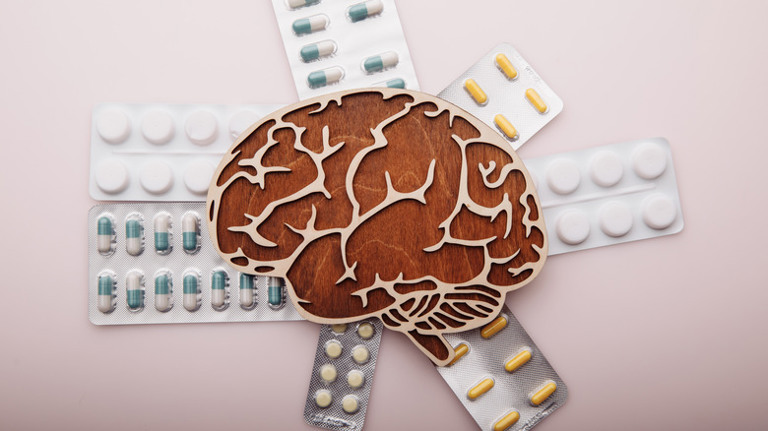Learn about brain health and nootropics to boost brain function
Nootropics May Improve Mental Focus And Concentration

“Limitless,” the popular sci-fi thriller featuring Bradley Cooper, tells the story of a struggling writer who achieves success after taking NZT-48, a pill that increases brain capacity. NZT-48 doesn’t exist in real life, but some drugs and supplements can boost brain power, creativity, attention, and memory.
We’re talking about the so-called “smart pills,” or nootropics, such as caffeine, piracetam, L-theanine, and Panax ginseng. Another example is modafinil, a central nervous system (CNS) stimulant prescribed for sleep disorders. In one study , healthy volunteers who took either 100 or 200 milligrams of the drug experienced improvements in reaction time, visual memory, decision making, and mental focus, reports the journal Psychopharmacology.
Nootropics are herbs, amino acids, stimulant agents, or medications that support brain function. Caffeine, the most widely used nootropic, may enhance alertness, task performance, processing speed, and other markers of cognitive performance, according to recent evidence published in Cureus. Other smart drugs can boost your energy and stamina or lift your mood . That said, let’s take a closer look at the science behind nootropics and their potential benefits.
Many college students and business professionals turn to nootropics when dealing with mentally demanding tasks. Proponents say that nootropics reduce mental fatigue and improve concentration, making it easier to stay focused. “I would not give them up willingly,” entrepreneur Erin Finnegan told ABC News . “The additional focus that I can have with them, yes, it does sustain the speed I am going at now and the many things, I would have to take a couple [of] things off my plate if I wanted to keep going without them,” she added. Some in Silicon Valley take more than 40 pills daily in an attempt to get a mental edge.
These products contain more or more ingredients that are supposed to boost cognitive performance. For example, L-theanine — a naturally occurring amino acid — may improve attention, reaction time, working memory, and task accuracy, according to a recent study published in the Journal of Medicinal Food. As the researchers note, this compound also promotes the formation of new neurons and can slow down cognitive decline .
The same goes for piracetam, a synthetic drug prescribed to those with dementia, dyslexia, and memory problems. This medication is also used as a nootropic due to its ability to improve brain performance, says MedicineNet . Piracetam and other compounds have proven benefits, but they’re often misused or abused, which increases the risk of side effects, reports a 2021 survey featured in Brain Sciences. They Can Also Reduce Anxiety And Stress
There are different types of nootropics on the market, and each has distinct properties. Panax ginseng, ashwagandha, L-theanine, and other smart drugs are classified as adaptogens because of their ability to help the body cope with stress. Ashwagandha, an adaptogenic herb, can reduce stress and anxiety while improving memory, reports a 2019 study published in Cureus. Over time, it may enhance cognition and mental well-being, leading to a better quality of life.
Similarly, ginseng can improve your body’s response to stress and prevent depression. What’s more, it has protective effects on the heart and brain and may benefit people with certain disorders, such as arthritis and diabetes, suggests a 2017 review featured in the Journal of Ginseng Research. In another study appearing in the same journal, this plant was shown to reduce elevated triglyceride levels, a common side effect of chronic stress. Its effects kicked in within six weeks of treatment, according to the report.
Nootropic supplements may also contain Ginkgo biloba, a natural adaptogen that can reduce acute stress. Panax ginseng, by comparison, is more effective against chronic stress, suggests a 2003 study published in the Journal of Pharmaceutical Sciences. Lion’s mane has similar benefits, making it easier to manage stress, anxiety, and depression, says WebMD . These mushrooms can also boost immune function, reduce inflammation, and enhance mental function in older adults. But Are Nootropics Safe?
Most drugs and supplements, including nootropics, carry potential side effects and may not be safe for everyone. The risk of adverse reactions is even higher when it comes to pharmaceutical drugs, which are often misused. For example, piracetam may cause a sense of unease or distress, memory loss, indigestion, or dizziness, according to 2015 research published in the journal Innovations in Clinical Neuroscience. Armodafinil, a nootropic that promotes wakefulness, could give you headaches, whereas citicoline — a synthetic form of choline — can lead to fatigue, muscle aches, tremors, or insomnia. In some cases, these drugs may cause psychosis, hypomania, paranoia, movement disorders, and other serious complications.
Natural nootropics are not necessarily safer. Caffeine, for instance, can trigger or exacerbate anxiety and affect your sleep, warns MedlinePlus . Other side effects, such as restlessness, jitters, and headaches, are common as well. Ginseng is generally safe, but it may still cause high blood pressure, digestive distress, vaginal bleeding, or liver inflammation in some people, explains the National Capital Poison Center . Additionally, it can interact with other herbs or medications, including antidepressants, blood thinners, caffeine, and diabetes drugs.
Last but not least, note that dietary supplements are classified as food products and don’t require FDA approval . For this reason, it’s hard to determine their safety and efficacy. Additionally, many consumers use nootropic stacks, which can increase the risk of herb-drug interactions and adverse effects.
Read this next: All The Ways Mental And Physical Health Are Related